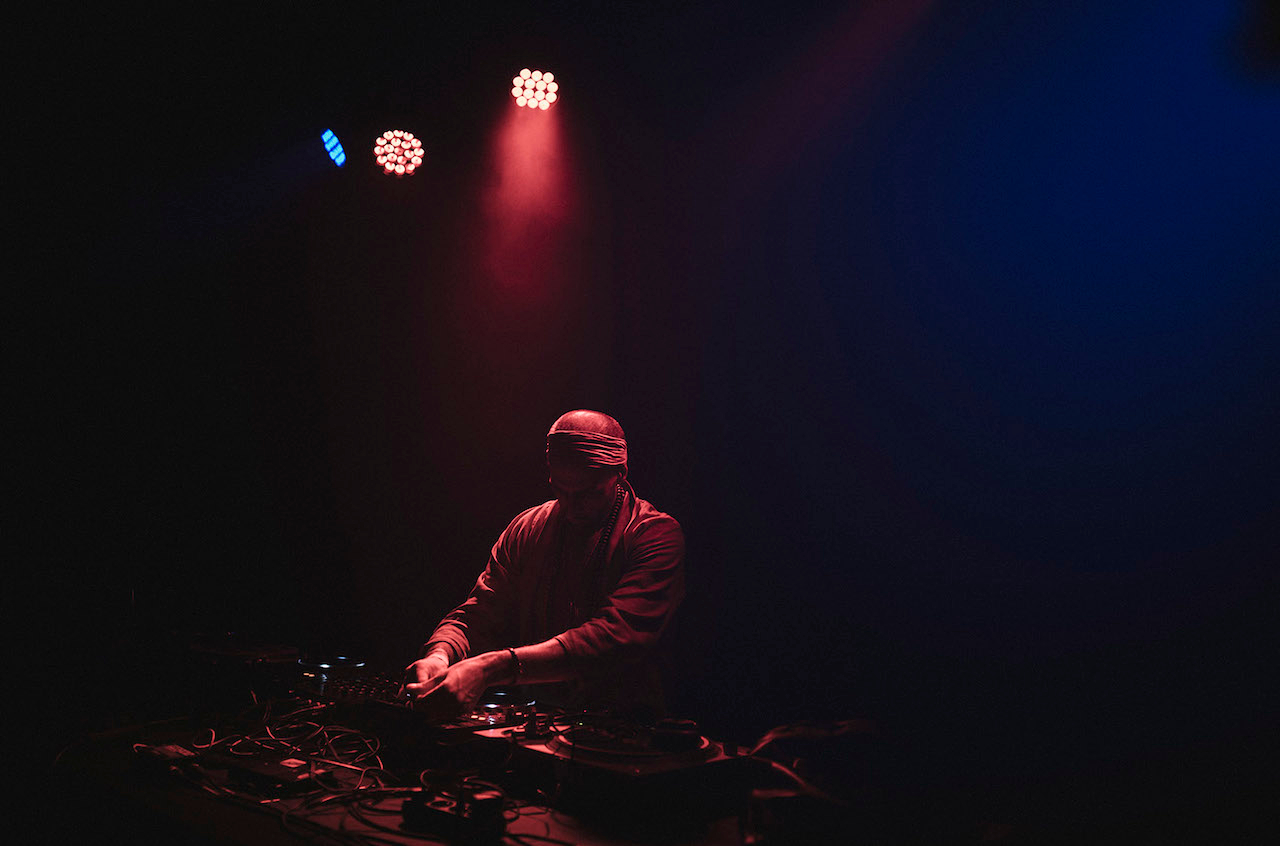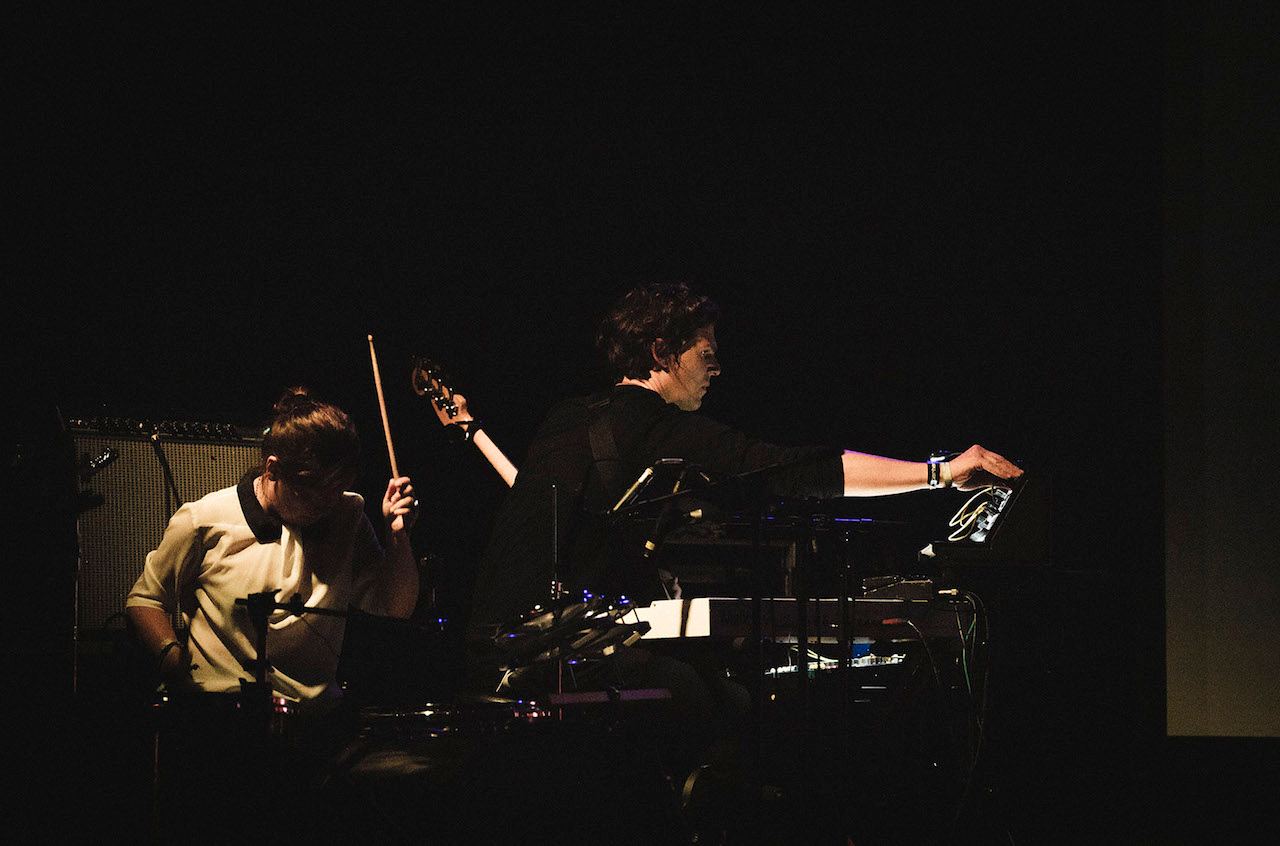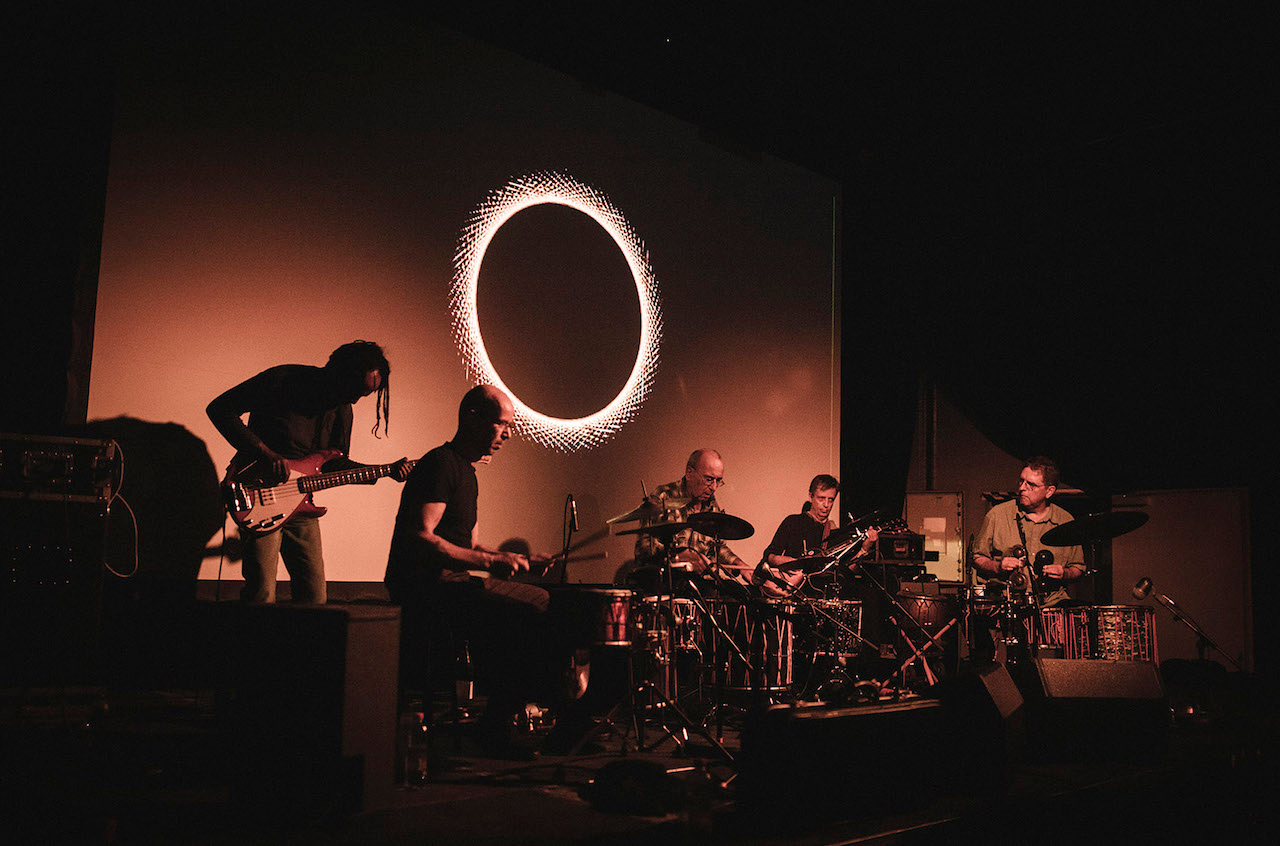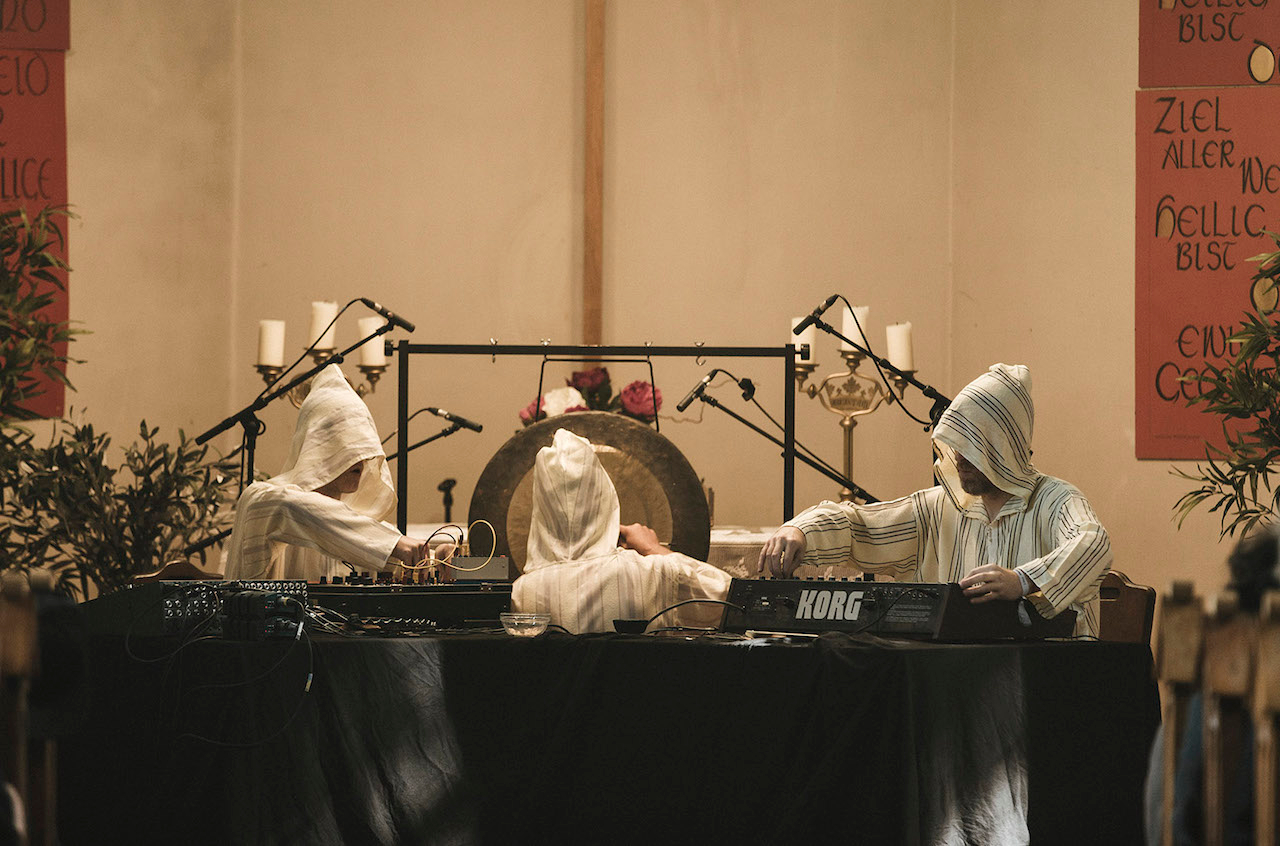- This small festival is making a big splash in experimental circles.
- The common feeling among attendees at Meakusma is that it's different from other European music festivals. In addition to the lineup stacked with lesser-known artists, there was an air of calm and intimacy lingering over the three-day event, aided by the sleepiness of the east Belgian town of Eupen and the modest-sized crowd's mellow, attentive mood. This was a weekend that prioritised quiet contemplation and serious musical discovery over excess.
That's not to say the vibe was downcast—it reached a peak on Saturday night when the main venue's three rooms were channelling different levels of dance floor energy. Shackleton, Jon K and Demdike Stare's Sean Canty filled out Halle with snaking, pointed permutations of bass music. In Kessellraum, Different Fountains delivered a dynamic and densely layered live set. Vakula made a contrary move to play the warmer sounds of disco, Italo and some Hi-NRG, which sounded a little incongruous in the almost exclusively experimental atmosphere.
Lena Willikens put her own stamp on Kühlraum, draping the auditorium in white camo netting that artfully marked out new micro dance floors. It was a simple trick that brought fresh verve to the venue and the crowd. The acts she curated for the evening drew purely from Japan-based talent, following her recent residency at Goethe-Institut in Kyoto. Compuma's warm-up of tunnelling techno was a particular highlight, while Rie Lambdoll's punchy, off-kilter live approach was also on-point. YPY's frantic cassette DJ set veered from fractured textures to a visceral whirlwind of off-grid beats. For her own performance, Willikens dropped the tempo down to a heady grind, employing her instinct for exotic and intense tones to fuel the dance floor until morning.
In the context of the weekend, Saturday night's spike in energy felt like a valuable way to break up the wealth of more delicate music on offer. That said, Meakusma cofounder Michael Kreitz explained to me that he felt three rooms of dance music on Saturday night was excessive, using up space that instead could have hosted more live concerts. His words were a telling indication of the motivations behind the festival—concerts are the true heart of Meakusma, and it's with them that the festival affirms its unique identity.
This year it felt like there was a concerted effort to welcome more music rooted in the traditional band-based format, albeit far from conventional rock. A highlight from the outside Hinterhof tent on Saturday afternoon was Chillera, two young girls from Ukraine who fused weighty dub with reverb-soaked surf guitars and stripped-back beats. In the midday September sun, they sounded sublime.
On Sunday night, the noise rock outfit Bégayer looked like they'd been transplanted straight from a farm in the south of France, hammering out a frenzied, freewheeling sound on homemade guitars that seemed like they might disintegrate at any moment. On Friday, even the Italian percussionist and producer Andrea Belfi brought a bold, rockist energy to his set, deftly keeping a rhythm while manipulating electronics to one side of his drum kit. Drums Off Chaos did credit to the tutelage of the late Jaki Liebezeit with a dynamic and predictably kosmische-flavoured performance. Tomaga's multi-instrumental live soundtrack to the '70s occult film Lucifer Rising closed Halle in eerie and spectacular fashion on Sunday.
There were also plenty of worthwhile live electronic performances. Anthony Child (AKA Surgeon), Dan Bean and Darren Russel donned white robes to perform a powerful drone exercise as The Transcendence Orchestra. Against the imposing backdrop of a 19th-century church, surrounded by gongs, synths and burning incense, their performance was evocative and ably channelled their interest in pagan traditions.
Meakusma's cultural offerings extended to field recording workshops, talks with the esteemed sound recordist Chris Watson and Phillip Sollmann (AKA Efdemin) & Konrad Sprenger's modular organ installation. The ambition and scope of the event was remarkable for its size, but more importantly, its intimacy allowed these spectacles to be experienced in a relaxed and unpretentious way.
There is a question mark over size—the festival suffered from the odd bottleneck for particularly popular acts. Although it was never advertised as sold-out, it would be hard to imagine how they could accommodate any more people. The small size and communal nature is one of its plus points—now in its third year, there's a certain familial spirit building up among regular attendees, with a sense of being privy to one of the best small festivals in Europe. It says a lot that the likes of Lawrence, who performed last year, returned in 2018 purely as an audience member, full of praise for what is a weekend of music like no other.
Photo credit /
Caroline Lessire
 In the context of the weekend, Saturday night's spike in energy felt like a valuable way to break up the wealth of more delicate music on offer. That said, Meakusma cofounder Michael Kreitz explained to me that he felt three rooms of dance music on Saturday night was excessive, using up space that instead could have hosted more live concerts. His words were a telling indication of the motivations behind the festival—concerts are the true heart of Meakusma, and it's with them that the festival affirms its unique identity. This year it felt like there was a concerted effort to welcome more music rooted in the traditional band-based format, albeit far from conventional rock. A highlight from the outside Hinterhof tent on Saturday afternoon was Chillera, two young girls from Ukraine who fused weighty dub with reverb-soaked surf guitars and stripped-back beats. In the midday September sun, they sounded sublime. On Sunday night, the noise rock outfit Bégayer looked like they'd been transplanted straight from a farm in the south of France, hammering out a frenzied, freewheeling sound on homemade guitars that seemed like they might disintegrate at any moment. On Friday, even the Italian percussionist and producer Andrea Belfi brought a bold, rockist energy to his set, deftly keeping a rhythm while manipulating electronics to one side of his drum kit. Drums Off Chaos did credit to the tutelage of the late Jaki Liebezeit with a dynamic and predictably kosmische-flavoured performance. Tomaga's multi-instrumental live soundtrack to the '70s occult film Lucifer Rising closed Halle in eerie and spectacular fashion on Sunday.
In the context of the weekend, Saturday night's spike in energy felt like a valuable way to break up the wealth of more delicate music on offer. That said, Meakusma cofounder Michael Kreitz explained to me that he felt three rooms of dance music on Saturday night was excessive, using up space that instead could have hosted more live concerts. His words were a telling indication of the motivations behind the festival—concerts are the true heart of Meakusma, and it's with them that the festival affirms its unique identity. This year it felt like there was a concerted effort to welcome more music rooted in the traditional band-based format, albeit far from conventional rock. A highlight from the outside Hinterhof tent on Saturday afternoon was Chillera, two young girls from Ukraine who fused weighty dub with reverb-soaked surf guitars and stripped-back beats. In the midday September sun, they sounded sublime. On Sunday night, the noise rock outfit Bégayer looked like they'd been transplanted straight from a farm in the south of France, hammering out a frenzied, freewheeling sound on homemade guitars that seemed like they might disintegrate at any moment. On Friday, even the Italian percussionist and producer Andrea Belfi brought a bold, rockist energy to his set, deftly keeping a rhythm while manipulating electronics to one side of his drum kit. Drums Off Chaos did credit to the tutelage of the late Jaki Liebezeit with a dynamic and predictably kosmische-flavoured performance. Tomaga's multi-instrumental live soundtrack to the '70s occult film Lucifer Rising closed Halle in eerie and spectacular fashion on Sunday.
 There were also plenty of worthwhile live electronic performances. Anthony Child (AKA Surgeon), Dan Bean and Darren Russel donned white robes to perform a powerful drone exercise as The Transcendence Orchestra. Against the imposing backdrop of a 19th-century church, surrounded by gongs, synths and burning incense, their performance was evocative and ably channelled their interest in pagan traditions. Meakusma's cultural offerings extended to field recording workshops, talks with the esteemed sound recordist Chris Watson and Phillip Sollmann (AKA Efdemin) & Konrad Sprenger's modular organ installation. The ambition and scope of the event was remarkable for its size, but more importantly, its intimacy allowed these spectacles to be experienced in a relaxed and unpretentious way. There is a question mark over size—the festival suffered from the odd bottleneck for particularly popular acts. Although it was never advertised as sold-out, it would be hard to imagine how they could accommodate any more people. The small size and communal nature is one of its plus points—now in its third year, there's a certain familial spirit building up among regular attendees, with a sense of being privy to one of the best small festivals in Europe. It says a lot that the likes of Lawrence, who performed last year, returned in 2018 purely as an audience member, full of praise for what is a weekend of music like no other. Photo credit / Caroline Lessire
There were also plenty of worthwhile live electronic performances. Anthony Child (AKA Surgeon), Dan Bean and Darren Russel donned white robes to perform a powerful drone exercise as The Transcendence Orchestra. Against the imposing backdrop of a 19th-century church, surrounded by gongs, synths and burning incense, their performance was evocative and ably channelled their interest in pagan traditions. Meakusma's cultural offerings extended to field recording workshops, talks with the esteemed sound recordist Chris Watson and Phillip Sollmann (AKA Efdemin) & Konrad Sprenger's modular organ installation. The ambition and scope of the event was remarkable for its size, but more importantly, its intimacy allowed these spectacles to be experienced in a relaxed and unpretentious way. There is a question mark over size—the festival suffered from the odd bottleneck for particularly popular acts. Although it was never advertised as sold-out, it would be hard to imagine how they could accommodate any more people. The small size and communal nature is one of its plus points—now in its third year, there's a certain familial spirit building up among regular attendees, with a sense of being privy to one of the best small festivals in Europe. It says a lot that the likes of Lawrence, who performed last year, returned in 2018 purely as an audience member, full of praise for what is a weekend of music like no other. Photo credit / Caroline Lessire